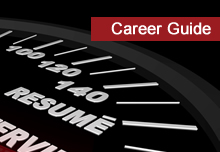Interview Dos & Don’ts
Interview DOs
- Dress appropriately for the industry; err on the side of being conservative to show you take the interview seriously. Your personal grooming and cleanliness should be impeccable.
- Know the exact time and location of your interview; know how long it takes to get there, park, find a rest room to freshen up, etc.
- Arrive early; 10 minutes prior to the interview start time.
- Treat other people you encounter with courtesy and respect. Their opinions of you might be solicited during hiring decisions.
- Offer a firm handshake, make eye contact, and have a friendly expression when you are greeted by your interviewer.
- Listen to be sure you understand your interviewer's name and the correct pronunciation.
- Even when your interviewer gives you a first and last name, address your interviewer by title (Ms, Mr, Dr) and last name, unless and until invited to do otherwise.
- Maintain good eye contact during the interview.
- Sit still in your seat; avoid fidgeting and slouching.
- Respond to questions and back up your statements about yourself with specific examples whenever possible.
- Ask for clarification if you don't understand a question.
- Be thorough in your responses, while being concise in your wording.
- Be honest and be yourself. Dishonesty gets discovered and is grounds for withdrawing job offers and for firing. You want a good match between yourself and your employer. If you get hired by acting like someone other than yourself, you and your employer will both be unhappy.
- Treat the interview seriously and as though you are truly interested in the employer and the opportunity presented.
- Do take criticism gracefully.
- Do equip yourself with a strong knowledge of the company.
- Do display a sense of humor.
- Do bring a pen and small notebook with you to the interview.
- Have intelligent questions prepared to ask the interviewer. Having done your research about the employer in advance, ask questions which you did not find answered in your research.
- Evaluate the interviewer and the organization s/he represents. An interview is a two-way street. Conduct yourself cordially and respectfully, while thinking critically about the way you are treated and the values and priorities of the organization.
- Do expect to be treated appropriately. If you believe you were treated inappropriately or asked questions that were inappropriate or made you feel uncomfortable, discuss this with a Career Advisor.
- Make sure you understand the employer's next step in the hiring process; know when and from whom you should expect to hear next. Know what action you are expected to take next, if any.
- When the interviewer concludes the interview, offer a firm handshake and make eye contact. Depart gracefully.
- After the interview, make notes right away so you don't forget critical details.
- Write a thank-you letter to your interviewer promptly.
Interview DON'Ts
- Don't make excuses. Take responsibility for your decisions and your actions.
- Don't make negative comments about previous employers or professors (or others).
- Don’t contradict yourself in responses.
- Don’t display intolerance or prejudice.
- Don't treat the interview casually, as if you are just shopping around or doing the interview for practice. This is an insult to the interviewer and to the organization.
- Don't give the impression that you are only interested in an organization because of its geographic location.
- Don't give the impression you are only interested in salary; don't ask about salary and benefits issues until the subject is brought up by your interviewer.
- Don't act as though you would take any job or are desperate for employment.
- Don't make the interviewer guess what type of work you are interested in; it is not the interviewer's job to act as a career advisor to you.
- Don't be unprepared for typical interview questions. You may not be asked all of them in every interview, but being unprepared looks foolish.
- A job search can be hard work and involve frustrations; don't exhibit frustrations or a negative attitude in an interview.
- Don't go to extremes with your posture; don't slouch, and don't sit rigidly on the edge of your chair.
- Don't assume that a female interviewer is "Mrs." or "Miss." Address her as "Ms." unless told otherwise. (If she has a Ph.D. or other doctoral degree or medical degree, use "Dr. [lastname]" just as you would with a male interviewer. Marital status of anyone, male or female, is irrelevant to the purpose of the interview.
- Don't chew gum or smell like smoke.
- Don't allow your cell phone to sound during the interview. (If it does, apologize quickly and ignore it.) Don't take a cell phone call. Don't look at a text message.
- Don't take your parents, your pet (an assistance animal is not a pet in this circumstance), spouse, fiance, friends or enemies to an interview. If you are not grown up and independent enough to attend an interview alone, you're insufficiently grown up and independent for a job. (They can certainly visit your new city, at their own expense, but cannot attend your interview.)





